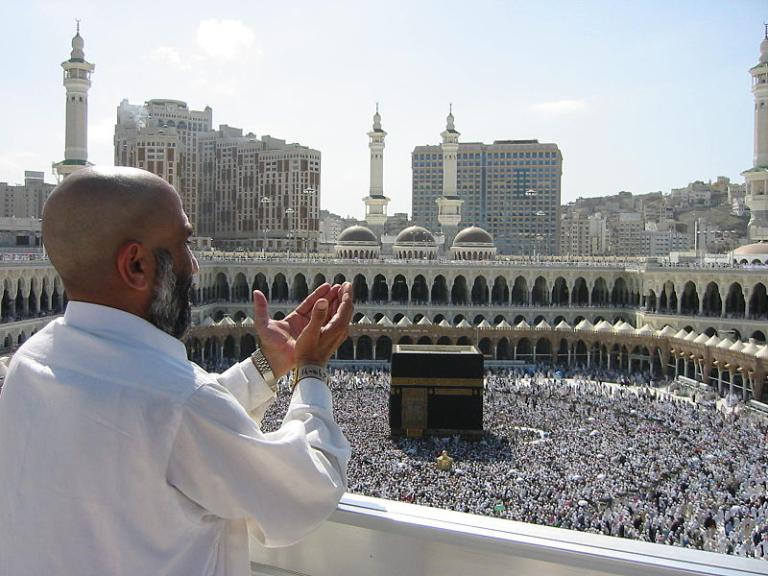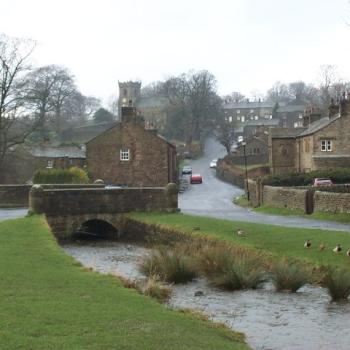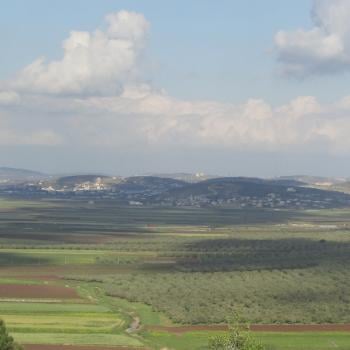
(Wikimedia Commons public domain photograph)
There were other connections between Arabian paganism and the religion of the biblical peoples. The pre-Islamic Arabs thought of themselves as the descendants of Ishmael. Beyond that, they seem to have been familiar with a story according to which both Ishmael and his father Abraham had come to central Arabia and had constructed a shrine in the town of Mecca, known as the “Ka‘ba.” The Qur’an, the holy book of Islam, refers to this story as something already familiar to its audience. It never needs to argue for it. “Children of Israel,” the Qur’an says, addressing Arabian Jews,
Remember . . . when We appointed the House to be a place of visitation for the people, and a sanctuary, and [said]: “Take to yourselves Abraham’s station for a place of prayer.” And We made covenant with Abraham and Ishmael: “Purify My House for those that shall go about it and those that cleave to it, to those who bow and prostrate themselves” . . . And when Abraham, and Ishmael with him, raised up the foundations of the House: “Our Lord, receive this from us . . . “[1]
No discussion of Ishmael and the Arabs that’s intended for a Latter-day Saint audience can avoid the question of who it was, in the Arab view, that Abraham nearly sacrificed on Mount Moriah. Many people, Arabs and Westerners alike, think that Muslims believe it to have been Ishmael, and not—contrary to the Bible—Isaac. But nearly everybody is wrong. Classical Muslim writers are evenly divided on the question, for although the story is known to the Qur’an, the Muslim scripture never identifies which son it was.
So We gave him tidings of a gentle son. And when [his son] was old enough to walk with him, [Abraham] said: O my dear son, I have seen in a dream that I must sacrifice thee. So look, what thinkest thou? He said, O my father! Do that which thou art commanded. Allah willing, thou shalt find me of the steadfast. Then, when they had both surrendered [aslamaa; i.e. to Allah], and he had flung him down upon his face, We called unto him: O Abraham! Thou hast already fulfilled the vision. Lo! thus do We reward the good. Lo! that verily was a clear test. Then We ransomed him with a tremendous victim.[2]
But, whatever the identity of the nearly-sacrificed son, the descent of Muhammad and the Arabs from Ishmael is of fundamental importance. They saw it as such, and so did Elder George A. Smith of the Council of the Twelve Apostles of The Church of Jesus Christ of Latter-day Saints. Speaking to the Saints in 1855, Elder Smith noted that
this Mahometan race, this dominant power of the 7th and 8th centuries, were the descendants of Abraham, which Mahometan records show in a straight-forward genealogy, from the family of Mahomet direct to that of Abraham, through the loins of Ishmael, the son of Abraham; and in this dominion there certainly was a recognition of the dominion of the sons of Abraham.[3]
The blessings of Abraham aren’t restricted solely to the line of Isaac. Speaking to that great prophet about Hagar and her son Ishmael, the Lord declared, “And also of the son of the bondwoman will I make a nation, because he is thy seed.”[4] Perhaps—despite the widespread ignorance of his life and work in the West, and despite centuries of prejudice against him among Christians—these blessings are reflected even in the career of Muhammad, a man who, in Elder Smith’s opinion, “descended from Abraham and was no doubt raised up by God on purpose to scourge the world for their idolatry.”[5]
It is Muhammad we must next consider.
[1] Qur’an 2:122, 127; A. J. Arberry’s translation.
[2] Qur’an 37:101-7; M. M. Pickthall’s translation.
[3] Journal of Discourses 3:34.
[4] Genesis 21:13.
[5] Journal of Discourses 3:32.












